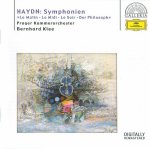Haydn’s diurnal trilogy, Symphonies Nos. 6, 7, and 8 (subtitled “Morning”, “Noon”, and “Night”), makes an engaging program when coupled with Symphony No. 22 in E-flat (“The Philosopher”). These performances by Bernhard Klee and the Prague Chamber Orchestra were recorded in 1974; they’re hearty, avuncular readings, and the many solo passages throughout these works give the first-chair players ample opportunity to impress. The finales of Symphonies Nos. 6 and 7 bring elegant contributions from solo flute and violin, though the solo cellist in the Andante movement of No. 8 sounds thin-toned and mannered. The double bassist negotiates his awkward solos in both “Le Midi” and “Le Soir” with a delicacy that’s surprising given the perceived constraints of his instrument.
Symphony No. 22 (1764) signalled a return to the Baroque church sonata format, with the contemplative slow movement from which the work takes its nickname placed first. Klee directs an appropriately studied, rather austere performance, and as with the other works on this disc, his reluctance to fully characterise Haydn’s distinctive writing tends to soften the pictorial aspects of these early descriptive symphonies. The Prague Chamber Orchestra delivers slow movements with respectful gravity, but quite often Haydn’s inimitable humour fails to register elsewhere.
Recorded sound is ample and full-bodied in these new transfers, but stylistically and idiomatically the performances are not instantly recommendable. From Chandos (in its “Enchant” reissues line) comes a superb boxed set of Haydn’s Symphonies Nos. 1-12, with lively and intelligent performances from Cantilena directed by Adrian Shepherd. These vigorous, congenial accounts are a snip at mid-price, but collectors will find even greater value on a Naxos disc that features Symphonies 6-8, with the Northern Chamber Orchestra under Nicholas Ward.
































